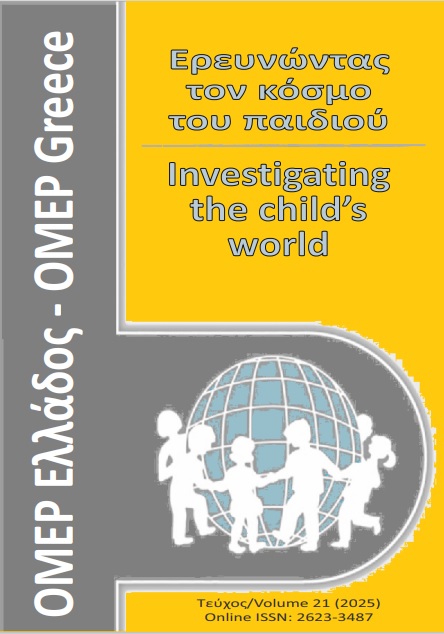Ιστορίες καλοσύνης: Μια ποιοτική διερεύνηση των αντιλήψεων παιδιών πρώτης σχολικής ηλικίας για την έννοια της καλοσύνης
Résumé
H παρούσα έρευνα διερευνά τις αντιλήψεις παιδιών πρώτης σχολικής ηλικίας για την έννοια της καλοσύνης. Το δείγμα αποτέλεσαν 28 παιδιά, 15 αγόρια και 13 κορίτσια, (M = 6,7 έτη, T.A. = .45), μαθητές και μαθήτριες της A' τάξης δημοσίων δημοτικών σχολείων. Μέσω ημιδομημένων συνεντεύξεων, διερευνήθηκε πώς τα παιδιά κατανοούν και αποδίδουν νόημα στην καλοσύνη με βάση τις προσωπικές τους εμπειρίες. Η θεματική ανάλυση των δεδομένων ανέδειξε έξι βασικούς θεματικούς άξονες: (α) πράξη βοήθειας, (β) συναισθηματική υποστήριξη, (γ) τρόπος συμπεριφοράς, (δ) κοινωνική αξία/ηθική πράξη, (ε) κοινωνική συνύπαρξη και (στ) αμοιβαία συμπεριφορά. Στις αφηγήσεις των παιδιών η καλοσύνη συνδέθηκε με πράξεις μοιράσματος, βοήθειας, συνεργασίας, φροντίδας και ευγένειας, με καθημερινές πρακτικές αλλά και με συμπεριφορές που αφορούν το "κοινό καλό". Τα ευρήματα αναδεικνύουν μια πολυδιάστατη κατανόηση της καλοσύνης, η οποία θεμελιώνεται στη φιλοκοινωνική συμπεριφορά, την ενσυναίσθηση, τον ηθικό συλλογισμό και την κοινωνική ρύθμιση. Η έρευνα υπογραμμίζει τη σημασία των καθημερινών εμπειριών στη διαμόρφωση της έννοιας της καλοσύνης και παρέχει χρήσιμες κατευθύνσεις για τον σχεδιασμό εκπαιδευτικών προγραμμάτων που βασίζονται στην καλοσύνη και προάγουν τις φιλοκοινωνικές συμπεριφορές των παιδιών.
Article Details
- Comment citer
-
Βαϊράμη Μ. (2025). Ιστορίες καλοσύνης: Μια ποιοτική διερεύνηση των αντιλήψεων παιδιών πρώτης σχολικής ηλικίας για την έννοια της καλοσύνης. Ερευνώντας τον κόσμο του παιδιού, 21. Consulté à l’adresse https://ejournals.epublishing.ekt.gr/index.php/omep/article/view/41781
- Numéro
- Vol. 21 (2025)
- Rubrique
- Επιστημονική αρθρογραφία & εκπαιδευτικές δράσεις

Ce travail est disponible sous licence Creative Commons Attribution - Pas d’Utilisation Commerciale 4.0 International.
Οι Συγγραφείς που δημοσιεύουν εργασίες τους σε αυτό το περιοδικό συμφωνούν στους παρακάτω όρους:
Οι Συγγραφείς διατηρούν τα Πνευματικά Δικαιώματα και χορηγούν στο περιοδικό το δικαίωμα της πρώτης δημοσίευσης ενώ ταυτόχρονα τα πνευματικά δικαιώματα της εργασίας προστατεύονται σύμφωνα με την Creative Commons Attribution License που επιτρέπει σε τρίτους - αποδέκτες της άδειας να χρησιμοποιούν την εργασία όπως θέλουν με την προϋπόθεση της διατήρησης των διατυπώσεων που προβλέπονται στην άδεια σχετικά με την αναφορά στον αρχικό δημιουργό και την αρχική δημοσίευση σε αυτό το περιοδικό.
Οι Συγγραφείς μπορούν να συνάπτουν ξεχωριστές, και πρόσθετες συμβάσεις και συμφωνίες για την μη αποκλειστική διανομή της εργασίας όπως δημοσιεύτηκε στο περιοδικό αυτό (π.χ. κατάθεση σε ένα ακαδημαϊκό καταθετήριο ή δημοσίευση σε ένα βιβλίο), με την προϋπόθεση της αναγνώρισης και την αναφοράς της πρώτης δημοσίευσης σε αυτό το περιοδικό.
Το περιοδικό επιτρέπει και ενθαρρύνει τους Συγγραφείς να καταθέτουν τις εργασίες τους μέσω διαδικτύου (π.χ. σε ένα ακαδημαϊκό καταθετήριο ή στους προσωπικές τους ιστοσελίδες) πριν και μετά από τις διαδικασίες της δημοσίευσης, καθώς αυτό μπορεί να οδηγήσει σε παραγωγική ανταλλαγή ιδεών και σκέψεων καθώς επίσης και σε γρηγορότερη και μεγαλύτερη χρήση και ευρετηρίαση της δημοσιευμένης εργασίας (See The Effect of Open Access).



